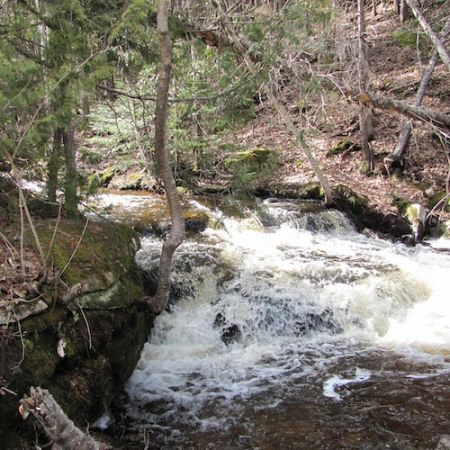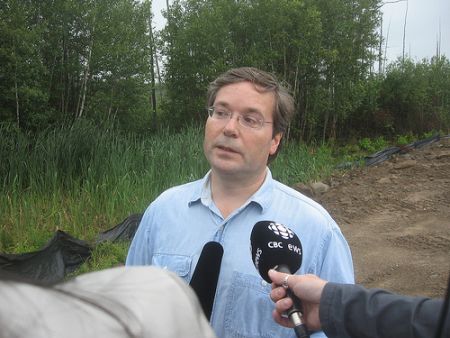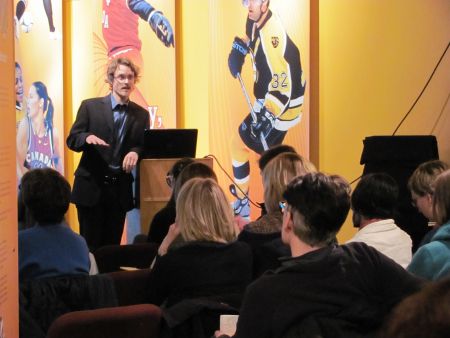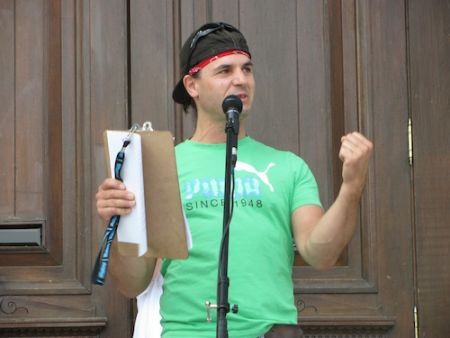Friday, 05 August 2011
Fredericton - The Friends of the UNB Woodlot want the City of Fredericton to hear their concerns and take a stand against shale gas in the city's limits but the city refuses to hear a presentation by the group. The concerned citizens group says that the city's land use plan has the power to stop future shale gas activity within the city's largest urban forest, the 3,800-acre University of New Brunswick Woodlot.
Development in the UNB Woodlot, found across from Regent Mall, has been a subject of ongoing protests over the past five years. Fredericton residents cite the woodlot's mature forest, wetlands and wildlife as reasons why the university, city and province should protect it and halt its conversion to big box stores, condos and pavement. In an era of inadequate government funding of post-secondary education, UNB like other universities, are developing their land endowments for money despite opposition from their students, faculty who use the space for research and the wider community who value the area for recreation such as walking, running, snowshoeing and skiing.
After discovering the UNB Woodlot, the Fredericton region and town limits of New Maryland were almost blanketed in shale gas licenses earlier this year, the Friends of the UNB Woodlot requested a presentation to Fredericton’s City Council so they could outline reasons why shale gas activity poses an unacceptable risk to the city's drinking water. Four major watersheds that extend over the entire south side of Fredericton and part of New Maryland originate in the UNB Woodlot.
"To date, the City Clerk’s Office, City Councillors and the Mayor are refusing to acknowledge the group’s request and the fact that exploration licenses have already been issued for the City of Fredericton and a large area surrounding the city limits," says Mark D'Arcy, an organizer with the Friends of the UNB Woodlot, who requested the meeting on June 25th.
Matthew Hayes, a professor of sociology at St. Thomas University, says, "Mayor Brad Woodside is baldly ignoring the views of people he has decided he doesn't have to listen to. But what Friends of the UNB Woodlot have to say, and the questions they have to ask should inform City Council's response to shale gas fracking. This is a dangerous business, and there is a lot of professional expertise being ignored by not hearing from Mark D'Arcy and others."
"The truth is, no one, including the developers, knows for sure what the consequences of shale gas development may be, especially on our city's drinking water. City Council needs to show some leadership on this issue to protect the interests of city residents. These oil and gas companies don't mind taking risks with the livelihood and health of Frederictonians. Council's approach should be more cautious and more mindful of the risks of these new extraction methods," notes Hayes.
On July 11th, the NB Media Co-op published a map showing SWN Resources' license area in Fredericton. Other media following up on the post discovered city and provincial government officials responsible for the environment did not know about the license, which was granted in March 2010 by the former Graham Liberal government.
Cheryl Norrad with the Purple Violet Press reported on July 18th that Eric Megarity, a Fredericton City Councilor and the City's Environment Committee Chair, was not aware of the shale gas licence in the city. Environment Minister Margaret-Ann Blaney's response to a Global TV reporter's question about the public concerns with shale gas was, "oh my gosh, there's all kinds of myths out there." Shale gas opponents say that the "emotional" and "misinformation" refrains heard from the shale gas industry and mimicked by the Conservative government in response to valid concerns of the impacts of shale gas development has been used to dismiss their concerns.
Stephanie Merrill, the Conservation Council's shale gas coordinator, says, "this is unfortunate given that citizens have taken the time to inform themselves of the impacts of shale gas and the government is clearly not taking their concerns seriously."
During the 1,500-strong rally against shale gas last Monday, August 1st, 2011 at the New Brunswick Legislature, Derek Simon, the emcee, said, "it is time that the Environment Minister do her job. She is supposed to uphold the Clean Water Act." A loud "no" came from the crowd when he asked if she was doing her job. D'Arcy says that watershed-based source protection should be implemented to protect New Brunswick’s sources of drinking water against contamination and depletion.
A deep concern for water is uniting shale gas opponents of different backgrounds. On Saturday, July 9th, 2011, approximately 300 people gathered in what participants called a powerful ceremony at the Old Burial Grounds in Fredericton to honour water. The Maliseet Grand Council opened up their ceremony to the public for the first time in light of current threats to water in the Wulustukyeg territory that include shale gas extraction.
Tom Alexander, with SWN Resources and the spokesperson for the entire shale gas industry in the province, says that no water contamination has ever resulted from fracking. Landowners from Arkansas to Pennsylvania say this is not true and a new report by the U.S. Environmental Protection Agency (EPA) backs up their assertions. The report cites the Parson's Well in West Virginia as a confirmed case of well water contaminated by fracking. The report's author, Carla Greathouse, suggests there are many more cases of well water contamination caused by fracking but the industry's settlements with landowners do not allow them to speak publicly about their contaminated well water, which makes it impossible for their government agency and the public to adequately review the risks.
D'Arcy says the unlikelihood of drilling in the UNB Woodlot gives him little comfort because he has found nothing in the regulations to prevent it from happening. “It is irresponsible for our Mayor and City Councillors to take a 'if-I-ignore-it-maybe-it-will-go-away' strategy to our concerns about drinking water contamination by shale gas development. Our watersheds and aquifer are literally surrounded by a 10-kilometre area of shale gas exploration licenses in all directions. This is an unacceptable risk to our drinking water. We want City Council to err on the side of caution and ban this activity due to the risk of serious or irreversible damage to our aquifer. The City of Fredericton can ban high-impact industrial uses from within the city limits using an amendment of their Zoning Bylaw Z-2.”
The City of Pittsburgh, New York State, the Province of Quebec and the country of France has either banned or put a moratorium on shale gas development. The town of Sackville tried to ban shale gas in their town limits a year ago but were quickly forced to reverse their decision in light of the implications of not forging an agreement with PetroWorth, which would mean that the company would not be required to conduct baseline testing on the municipal water system and thus would not be liable for any damage that might be done to the water supply during testing, exploration or production. In September, PetroWorth said they were no longer interested in exploring for shale gas in Sackville's town limits because of the opposition and instead they would focus on exploring privately-owned land in the Sackville basin. PetroWorth is chaired by Allan Graham, former New Brunswick Natural Resources Minister under McKenna's government and father of former New Brunswick Premier Shawn Graham.
D'Arcy's concerns and questions for the city and province resonate with the approximately thirty community-based anti-shale groups that have formed across the province. "How will shale gas development in our watersheds, and in the Penniac, Durham Bridge and Stanley areas affect our drinking water? Who will pay for treatment of millions of litres of contaminated fracking water? What will be the impacts of a massive increase in truck traffic on our roads? Will there be independent baseline water testing of our aquifer and watersheds for the radioactive elements and hundreds of fracking chemicals that could be potential contaminants in our watersheds?"
This article appears originally at www.nbmediacoop.org. The Halifax Media Coop thanks our New Brunswick counterparts for sharing.






